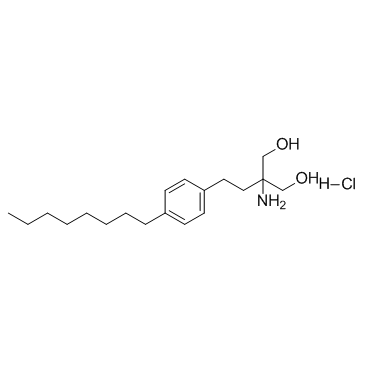162359-56-0
| Name | fingolimod hydrochloride |
|---|---|
| Synonyms |
FTY720 Hydrochloride
2-amino-2-(2-(4-octylphenyl)ethyl)propane-1,3-diol hydrochloride 2-Amino-2-[2-(4-octylphenyl)ethyl]propane-1,3-diol hydrochloride (1:1) FTY720 2-Amino-2-[2-(4-octylphenyl)ethyl]-1,3-propandiolhydrochlorid 2-Amino-2-(4-octylphenethyl)propane-1,3-diol hydrochloride Fingolimod Hydrochloride 2-Amino-2-[2-(4-octylphenyl)ethyl]-1,3-propanediol hydrochloride (1:1) 2-Amino-2-[2-(4-n-octylphenyl)ethyl]propane-1,3-diol Hydrochloride 2-amino-2-[2-(4-octylphenyl) ethyl]-1,3-propanediol hydrochloride 1,3-Propanediol, 2-amino-2-[2-(4-octylphenyl)ethyl]-, hydrochloride (1:1) Fingolimod HCl 2-Amino-2-[2-(4-octylphényl)éthyl]-1,3-propanediol chlorhydrate 2-Amino-2-[2-(4-octyl-phenyl)-ethyl]-propane-1,3-diol hydrochloride Fingolimod hydrochloride 2-Amino-2-[2-(4-octylphenyl)ethyl]-1,3-propanediol hydrochloride MFCD00939512 Fingolimod (hydrochloride) |
| Description | Fingolimod hydrochloride is a sphingosine 1-phosphate (S1P) antagonist with an IC50 of 0.033 nM in K562 and NK cells. |
|---|---|
| Related Catalog | |
| Target |
IC50: 0.033 nM (S1P, in K562 and NK cells)[1] |
| In Vitro | The monocyte-derived immature dendritic cells (iDCs) are pretreated with various concentrations of S1P for various periods of time prior to their incubation with NK cells. Four hours incubation of autologous or allogeneic iDCs with 0.2-20 μM of S1P significantly protectes these cells from NK cell lysis. The IC50 values of S1P are calculated at 160 nM for autologous iDCs, and 34 nM for allogeneic iDCs. Next, the inhibitory effect of S1P is revered by various concentrations of Fingolimod hydrochloride (FTY720) or SEW2871, with an IC50 effect of 173 or 15 nM, respectively[1]. The immunomodulator Fingolimod hydrochloride (FTY720) is a structural analogue of S1P and acts in its phosphorylated isoform as an unselective agonist on S1P1 and S1P3-5 and a selective functional antagonist on S1P1. FTY720 enhances serum S1P levels by inhibiting S1P lyase activity[2]. The number of Iba1+ cells in ipsilateral CA3 is counted, and the corresponding graph shows a significantly lower number of Iba1+ cells in CA3 of the Kainic acid (KA)+FTY720 group than in CA3 of KA group[3]. |
| In Vivo | Administration of the immunomodulator Fingolimod hydrochloride (0.1 mg/kg i.v.) increases serum S1P, improves impaired systolic contractility and activates the PI3K-pathway in the heart. Administration of Fingolimod hydrochloride (FTY720) causes a significant rise in serum S1P levels in both sham-operated animals and animals challenged with LPS/PepG (P<0.0001)[2]. FTY720 attenuates microgliosis, modulates the microglia inflammatory phenotype by reducing LPS-mediated activation of p38 MAPK signalling pathway. Thus, FTY720 shares both direct neuroprotective and anti-inflammatory properties that can contribute to overall neuroprotection. In particular, the potential of FTY720 to switch microglia phenotype from a detrimental to a protective one represents a therapeutic mechanism for attenuating acute and chronic CNS damage[3]. |
| Cell Assay | Immature dendritic cells (DCs) are left intact or are incubated with 2 μM S1P, 10 nM Fingolimod hydrochloride, 10 nM SEW2871 or the combinations of S1P with these drugs for 4 h. As a control 1 μg/mL LPS is used. The cells are washed and incubated in a 96-well plate (v-bottom, 2×105 cells per well), washed again and resuspended in PBS buffer containing 0.1% sodium azide. They are labeled with 1 μg/mL FITC-conjugated mouse anti-human CD80, 1 μg/mL FITC-conjugated mouse anti-human CD83, 1 μg/mL FITC-conjugated mouse anti-human CD86, 1 μg/mL FITC-conjugated mouse anti-human HLA-class I, 1 μg/mL FITC-conjugated mouse anti-human HLA-DR, 1 μg/mL FITC-conjugated mouse anti-human HLA-E, or 1 μg/mL FITC-conjugated mouse IgG as a control. The cells are washed twice, and examined in the flow cytometer. Markers are set according to the isotype control FITC-conjugated mouse IgG[1]. |
| Animal Admin | Mice[2] This study is carried out on 2-month-old male C57BL/6J mice or sphingosine kinase-2 deficient (SPHK-2-/-) mice weighing 25-30 g, receiving a standard diet and water ad libitum. C57BL/6J wild-type or SPHK-2-/- mice receives i.p.-injections of LPS (9 mg/kg)/PepG (1 mg/kg) or its vehicle (0.9% saline). Sham mice are not subjected to LPS/PepG, but are otherwise treated in the same way. At 1 h after LPS/PepG challenge, mice are treated with Fingolimod hydrochloride (0.1 mg/kg i.v.) or its vehicle (10% DMSO). To elucidate the role of different S1P receptors in the observed effects of Fingolimod hydrochloride, mice receive (45 min after LPS/PepG and 15 min prior to Fingolimod hydrochloride) the selective PI3K inhibitor LY294002 (0.3 mg/kg i.v.) or the selective S1P2 receptor antagonist JTE 013 (1 mg/kg i.v.) or (1 h after LPS/PepG) the selective S1P1 receptor agonist SEW2871 (1 mg/kg i.v.) or vehicle (10% DMSO). Rat[3] The Sprague-Dawley rats (200 to 250 g) are used. Fingolimod hydrochloride is applied icv (1 μg/2 μL), together with Kainic acid (KA), plus intraperitoneally (ip; 1 mg/kg) 24 h before, and daily, until sacrifice 3 days aftericv. Rats are evaluated for neurological score, neuronal loss in CA3 hippocampal region and activation of microglia at the lesion site. |
| References |
| Density | 1.016g/cm3 |
|---|---|
| Boiling Point | 479.5ºC at 760 mmHg |
| Melting Point | 102-107ºC |
| Molecular Formula | C19H34ClNO2 |
| Molecular Weight | 343.932 |
| Flash Point | 243.8ºC |
| Exact Mass | 343.227814 |
| PSA | 66.48000 |
| LogP | 4.70660 |
| Vapour Pressure | 5.28E-10mmHg at 25°C |
| Index of Refraction | 1.531 |
| Storage condition | -20°C Freezer |
| Symbol |

GHS07 |
|---|---|
| Signal Word | Warning |
| Hazard Statements | H315-H319-H335-H412 |
| Precautionary Statements | P261-P273-P305 + P351 + P338 |
| Hazard Codes | Xi |
| Risk Phrases | 36/37/38-52/53 |
| Safety Phrases | 26-61 |
| RIDADR | NONH for all modes of transport |
| HS Code | 2922199090 |
| HS Code | 2922199090 |
|---|---|
| Summary | 2922199090. other amino-alcohols, other than those containing more than one kind of oxygen function, their ethers and esters; salts thereof. VAT:17.0%. Tax rebate rate:13.0%. . MFN tariff:6.5%. General tariff:30.0% |
